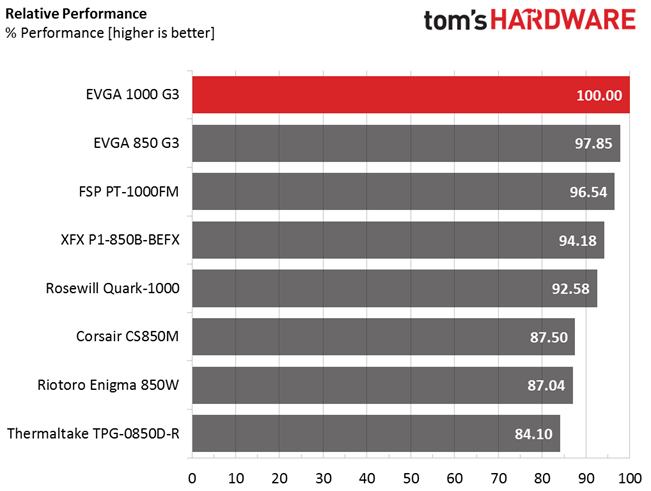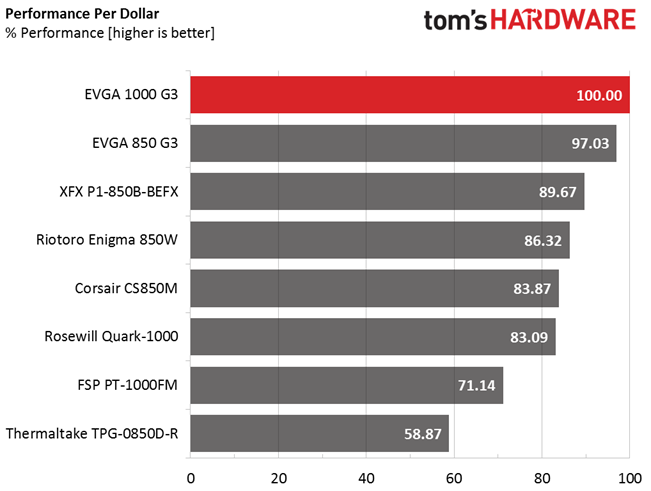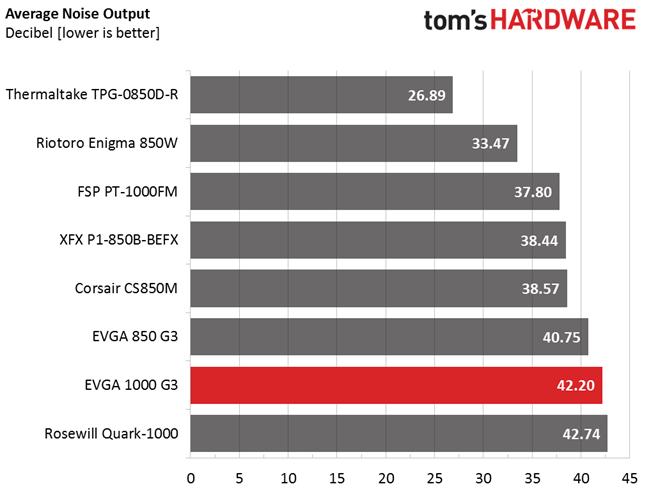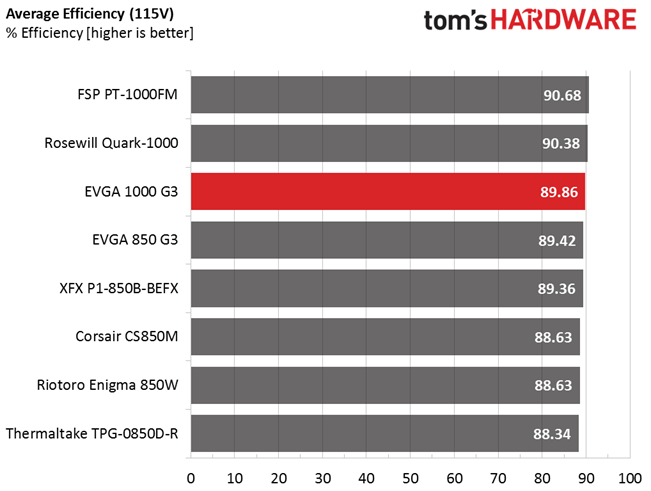EVGA SuperNOVA 1000 G3 PSU Review
We already reviewed the SuperNOVA 850 G3, which left a good impression on us. Today, we're looking at the 1000 G3, this family's current flagship model. It's a physically diminutive PSU that offers high performance in every area.
Why you can trust Tom's Hardware
Performance, Performance Per Dollar, Noise, And Efficiency Ratings
Performance Rating
The following graph shows the 1000 G3's total performance rating, comparing it to other units we have tested. To be more specific, EVGA's new SuperNOVA is shown as 100 percent, and every other model is shown relative to it.
EVGA's G3 units take the lead in our comparison of Gold-rated PSUs, at least until Seasonic can put the finishing touches on its competing Prime units.
Performance Per Dollar
The following chart may be the most interesting to many of you because it depicts performance per dollar. We looked up the current price of each PSU on popular online shops and used those prices and all relative performance numbers to calculate the index. If the specific unit wasn't available in the United States, we searched for it in popular European Union shops, converting the listed price to USD (without VAT). Note that all of the numbers in the following graph are normalized by the rated power of each PSU.
With a price of $140, the 1000 and 850 G3 models bring terrors to the competition. It's as simple as that. Their prices are currently very good considering the features and performance we just saw. We don't know how long EVGA plans to maintain these levels, though. Before the recent price drop, you'd spend $170 on a 1000 G3. Even that's fair given what this PSU can do.
Noise Rating
The graph below depicts the cooling fan's average noise over the PSU's operating range, with an ambient temperature between 30°C and 32°C (86°F to 89.6°F).
The Achilles' heel of EVGA's high-capacity G3s (since we haven't reviewed the lower-capacity ones yet) is too much noise. Their HDB fans spin at high speeds because of an aggressive fan profile.
With such a long warranty period, EVGA and Super Flower wanted to play it safe rather than deal with numerous RMAs years from now.
Get Tom's Hardware's best news and in-depth reviews, straight to your inbox.
Efficiency Rating
The following graph shows the PSU's average efficiency throughout its operating range, with an ambient temperature close to 30°C.
Efficiency-wise, the new Leadex II platform fares very well, even against Platinum-rated competition.
Current page: Performance, Performance Per Dollar, Noise, And Efficiency Ratings
Prev Page Ripple Measurements Next Page Pros, Cons, And Final Verdict
Aris Mpitziopoulos is a contributing editor at Tom's Hardware, covering PSUs.
-
powernod 140$. Exactly the same cost with Corsair's RMx1000 current pricing. Not sure which unit i would choose between those 2.Reply -
BugariaM Nice.Reply
>>>The 1000 G3's single bulk cap is provided by Chemi-Con (400V, 820uF, 2000h @ 105°C, CE)
Strangely, but I did not find "CE" series of capacitors in the Nippon Chemi-Con catalog -
10tacle Wow. The price point of this and overall performance makes this a serious player even for those who were in the market for nothing more than 850W gold or even platinum PSUs. So many people out there say "you don't need more than a xxxW power supply for your build." I like to buy based on <60% of calculated max load use of my build for less fan noise, heat output, and higher efficiency wall draw.Reply
Buying a gold 600W PSU when my rig uses 500W for example does not make much sense to me. I'd prefer to spend a little more and buy a gold 850W ($110USD vs. $130USD in the example of these two 650 & 850 G3 series on NewEgg right now). Not only for a higher efficiency operation as described above, but for future headroom growth. But I understand many do not think that and look to save a few dollars everywhere...one being on the PSU. -
10tacle Reply19478429 said:140$. Exactly the same cost with Corsair's RMx1000 current pricing. Not sure which unit i would choose between those 2.
Keep in mind when comparing the RM1000x that it was introduced at $180 in November 2015 and it took nearly a year to see the prices drop down below $150. The EVGA was originally released at $170 and has only been out for four months. Also keep in mind that the Corsair is marketed more for silent operation (drawback to that shown below).
If none of the drawbacks described and shown here do not bother you, and if overall "hot" efficiency and exhaust temperature are among top priorities for you, then the EVGA is the better performer. Average efficiency result of 7 load line tests, and the average exhaust temps under each test:
EVGA - 88.571%, 45.0C
Corsair - 87.857%, 49.8C
^^While the <1% efficiency difference is nominal and will not be seen on your monthly power bill, that nearly 5C difference coming out can make a slight difference in the temperature of your room in the summer. So the Corsair being quieter has a drawback.
http://www.jonnyguru.com/modules.php?name=NDReviews&op=Story4&reid=494 (EVGA)
http://www.jonnyguru.com/modules.php?name=NDReviews&op=Story4&reid=449 (Corsair)
-
Co BIY I would have liked to see the EVGA 1000 G2 in the performance tables as well. Both to see the generational improvement and to make a value comparison while both units are on the market.Reply
Is EVGA stopping production of the G2 series ? -
hst101rox 10TACLE, if the efficiency of the EVGA and the Corsair are nearly identical, the ~5 degree C temp difference could be just from the amount of airflow being less in the Corsair. Power consumption is the only thing that equates to BTUs, heat.Reply -
10tacle Reply19479497 said:10TACLE, if the efficiency of the EVGA and the Corsair are nearly identical, the ~5 degree C temp difference could be just from the amount of airflow being less in the Corsair. Power consumption is the only thing that equates to BTUs, heat.
That's why I stated the downside to the Corsair is the hotter air coming out the back. Same thing with a video card: you have to sacrifice more heat output for a quieter fan speed.
-
Aris_Mp I don't have 115V test results (but only 230V) for the G2s, so I couldn't add them to the graphs.Reply -
Co BIY "We didn't get any OCP results because our unit died during the OPP test, meaning either that this particular sample had a problem or OPP is set very high."Reply
Seems like this would be a big deal ?
Maybe at least one bullet in the Con column. -
Aris_Mp I have another one here, which come late, to test. If it dies as well then I will update the con list.Reply



